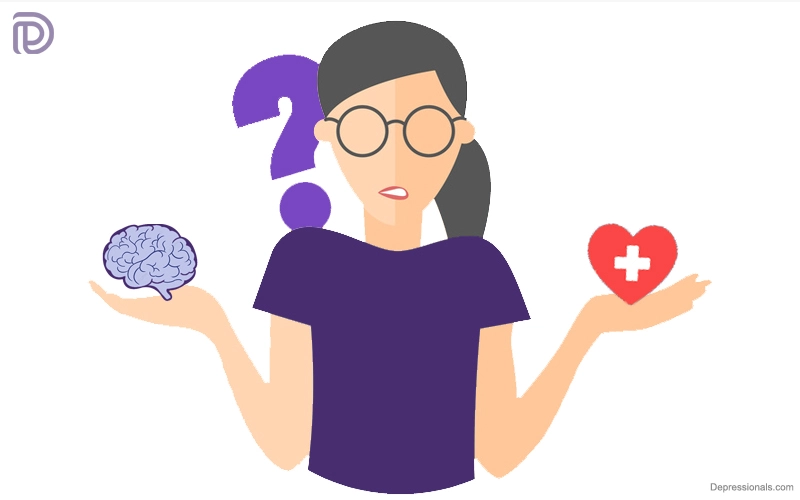What are mental disorders?
Mental disorders (or mental illnesses) are chronic conditions that impact your thoughts, feelings, emotions and behavior. They may be short-term or long-term (chronic). They may have an impact on your capacity to interact with people and operate on a daily basis.
Mental illness is a regular problem. In a given year:
- Nearly one-fifth of all people in the United States (19%) suffer from mental illness.
- One in every 24 people (4.1%) suffers from a mental disorder*.
- One in every twelve people (8.5%) has a medically diagnosed substance abuse disorder.
Mental illness may be managed. The overwhelming majority of people with mental health disorders go about their everyday lives unaffected.
Many individuals who suffer from mental illnesses are hesitant about discussing their condition. But there is no need to be embarrassed about mental illness! It is a medical condition like heart disease or diabetes.
Mental health disorders are also curable. Treatments are available to help individuals effectively manage mental health problems, and our knowledge of how the human brain works is constantly increasing.
Communication, emotions, thinking, resilience and self-esteem all rely on one’s mental health. Relationships, personal and emotional well-being, and contributing to the community or society all need good mental health.
Mental illness has no age, gender, location, money, social position, race/ethnicity, religion/spirituality, sexual orientation, background or other elements of cultural identification. It may affect anybody. While mental illness may strike at any age, three-quarters of all cases begin before the age of 24.
Many different types of mental disorders exist. Some are moderate and only have a little impact on everyday living, such as some phobias (abnormal fears). Other mental health issues are so serious that they may need hospitalization.
Read: Hoarding Disorder
Types of mental illness
There are many types of mental disorders. Here is the mental disorders list:
- Anxiety disorders, such as panic disorder, obsessive-compulsive disorder and phobias
- Mood disorders such as depression, bipolar disorder and others
- Eating disorders
- Impulse control and addiction disorders
- Stress response syndromes
- Personality disorders
- Dissociative disorders
- Factitious disorders
- Sexual and gender disorders
- Somatic symptom disorders
- Tic disorders
- Post-traumatic stress disorder
- Psychotic disorders, such as schizophrenia
Other diseases or conditions that affect the brain, such as numerous sleep-related issues and many types of dementia, including Alzheimer’s disease, are often categorized as mental health disorders.
Read: Delusional Parasitosis
What are the causes of mental disorders?
Mental disorder is caused by a variety of factors. A variety of variables may increase the risk of mental illness, including:
- Your genes and family history
- Your life experiences, such as stress or a history of abuse, particularly if they occurred when you were a kid
- Biological causes such as chemical abnormalities in the brain
- A traumatic brain injury
- When a woman is pregnant, she may be exposed to viruses or hazardous substances.
- Consumption of alcoholic drinks or recreational substances
- Having a severe medical problem, such as cancer
- Feeling lonely or alone due to a lack of friends
- Personality defects do not create mental illnesses. They’ve got nothing to do with being a slacker or a weakling.
Read: General Adaptation Syndrome
Who is at risk of developing mental illnesses?
Mental illnesses are quite prevalent. More than half of all Americans will be diagnosed with a mental illness at some point in their lives.
How are mental disorders diagnosed?
The procedure for getting a diagnosis includes the following steps:
- A medical history
- A possible lab testing and physical exam if your doctor suspects that other medical problems are affecting your symptoms.
- A psychological assessment. You’ll be asked questions on how you think, feel and act.
Read: Retrograde Amnesia
Mental disorders treatment
Treatment is determined by the kind of mental illness you have and its severity. You and your doctor will create a treatment plan that is unique to you. It basically involves some kind of treatment. You may also use prescription medications. Some individuals need social assistance as well as instruction on how to manage their illness.
You may need more extensive therapy in certain instances. It’s possible that you must go to a psychiatric hospital. This may be due to the severity of your mental condition. It may also be because you are in danger of injuring yourself or someone else. You will get group discussions, counseling and activities with mental health experts and other patients while in the hospital.






Do you have a spam problem on this site; I also am a blogger, and I was wondering your situation; many of us have developed some nice procedures and we are looking to exchange solutions with others, please shoot me an email if interested.
Hi there, i read your blog from time to time and i own a similar one and i was just curious if you get a lot of spam responses? If so how do you stop it, any plugin or anything you can suggest? I get so much lately it’s driving me insane so any help is very much appreciated.